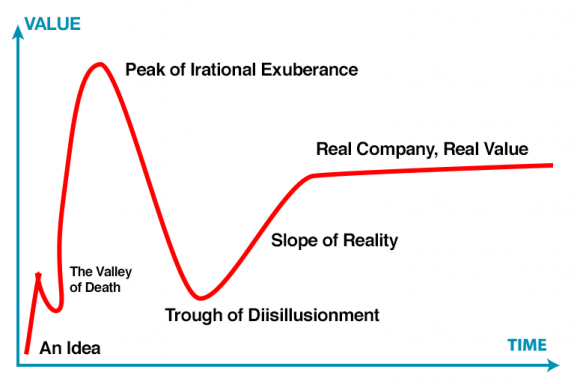
If you build it… they will come is an exceedingly common expectation of naïve, first-time entrepreneurs, who have yet to learn the “real world” difficulties of finding and selling to customers. Similarly, for funding first-time startups too often entrepreneurs expect a good idea and 80 page business plan is sufficient for an investor to invest. I call this erroneous expectation, If you think it… they will fund.
The realities of funding are quite different. Investing in startups is a big risk. Most startups fail, and with it, those investments turn to dust. Investors thus want more than your thoughts to believe in your plan. They want proof that the market truly exists. They want proof that the price you project is what customers are willing to pay. And just as importantly, they want proof that you are capable of attracting a great team, will use their capital efficiently, are able to close sales, communicate your progress, and generally that you are a good business person and a good person to do business with.
These are not the topics named in the prototypical 10 slide startup presentation. But including those answers within that presentation is what sets apart the funded startups from the masses of unfunded startups. Let’s look at each in more detail:
Proving the opportunity. How many potential customers have you talked to? If the answer is less than a dozen, keep at it. No matter whether your plan is still an idea or a prototype or in early sales, investors want to hear stories from the field. Talk to dozens of potential customers, summarize what they are saying, and tell a story or two that helps convince the investor that there is a real opportunity for a real business.
Proving leadership. Ultimately an investment is a partnership between entrepreneur and investor. To prove yourself trustworthy to the investor, prove yourself capable of building and managing a team. If others are following you in your idea, then investors are more likely to join as well, bringing money instead of talent. If no one wants to work with you, no investors will want to either. And yes, if you have nothing more than an idea, and no money, it is difficult to build a team. All the more reason a team proves out your worth. Spend your equity. Promise future remuneration. Do whatever it takes to build a team.
Proving the price. It is difficult to prove a price without having a product to sell. None the less, you need to show proof. Show off the price your competition charges. Show off any early sales. If you have nothing yet to sale, ask those customers to sign a letter of intent. Do something to prove that actual money will be paid for your product/service.
Make sales. Nothing proves a business better to investors than revenues. Paying customers (or even enough non-paying customers) shows value in your product. If you think you can’t make a sale without a few hundred thousand dollars of investment, think again. Reread The Lean Startup, and rethink your minimal viable product. Be resourceful. Be creative. You need only prove the concept, not deliver a robust, complete solution.
Lastly, don’t wait for investors. Pre-sell your product. Run a crowdfunding campaign. Enter a few business plan competitions. Apply for accelerators. Look for grants. There are sources of money for startups that don’t care that you only have an idea. For these alternative sources, if you think it… they just might fund.
And more realities of startup funding, check out Luni’s newest book, The Next Step: The realities of funding a startup, now available at Amazon.com















Good advice as always. Thanks.